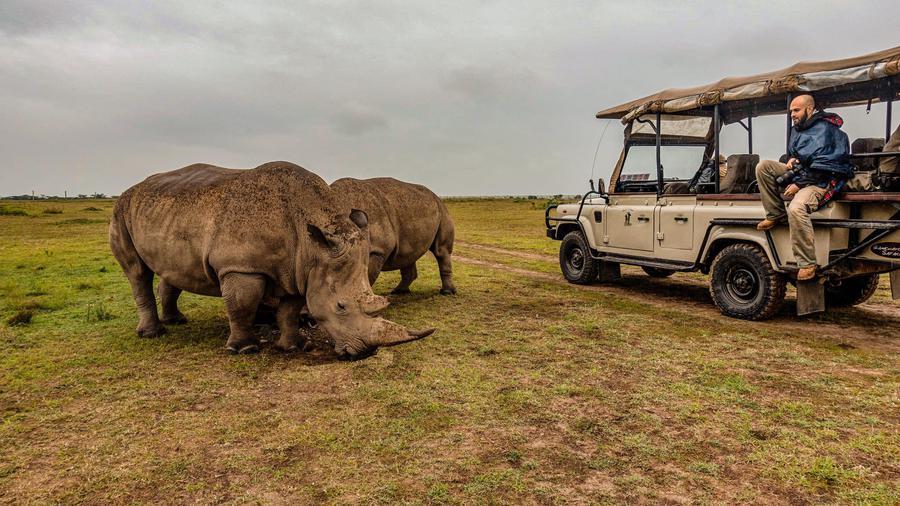
Wildlife Tourism: In Search Of Authentic Experiences
-
Deutsch
de
“Wildlife-Tourism” – auf der Suche nach authentischen Erfahrungen
Read more:“Wildlife-Tourism” – auf der Suche nach authentischen Erfahrunge
Français
fr
Le ((Wildlife Tourism)) à la recherche d'expériences authentiques
Read more: Le ((Wildlife Tourism)) à la recherche d'expériences authentique
Italiano
it
Wildlife tourism, alla ricerca di esperienze autentiche
Original
Read more: Wildlife tourism, alla ricerca di esperienze autentich
He inherited his love of travel from his mother, who first took him to the wilds of Africa. Over the years, what began as a desire to photograph animals evolved into something deeper.“The tourist tells you where they were taken; the traveller tells you where they chose to go... I am a kind of third character, always in search of authentic experiences,” says Christopher Walti, who in 2023 left his job as a manager in Switzerland to follow his passion and become a private guide, specialising in trips off the beaten track link
For him, travelling the world has never been about ticking destinations off a list, but rather about immersing himself fully in a place.“You only need to pack a few essentials: binoculars, a hat with a mosquito net, technical clothing, an emergency kit and, above all, a lot of flexibility and open-mindedness.”
One thing never missing from his backpack is his photographic equipment – his images could easily grace the covers of National Geographic.
Herds of wildebeest brave the waters of the Mara River during migration in the heart of Kenya's Masai Mara National Park.
His schedule is unpredictable: he has no fixed calendar and may be away for six weeks or have two months without commitments.“If I have a gap in my calendar, I use it to explore new destinations I can offer to clients.” As for the decision to leave a stable job, he says he has no regrets, even if there have been challenges:“We often forget that when you are free, you have to manage everything yourself. There are no more goals imposed by others – you have to define and achieve your own. After all, making a living from travel doesn't just mean seeing new places; it means changing how you see the world.”
Conscious choices for sustainable tourismWildlife tourism is booming. According to the World Tourism OrganizationExternal link , this sector accounts for around 7% of global tourism and is growing by 3% annually. On the one hand, the desire to connect with nature can support ecosystems and local communities, as tourism creates economic incentives that strengthen conservation efforts.“During my travels, I've seen that if there's no economic interest, there's no interest in preserving anything,” Walti explains.
On the other hand, this very human presence can threaten biodiversity: more and more wild animals are changing their behaviour due to human interference.“I read that because of mass tourism, some lions have learnt to hunt by using jeeps as cover, hiding behind them to ambush prey.”
In some cases, animals develop surprising survival strategies.“I remember seeing an impala always lingering near the lodge: it was wild, but it stayed close because it had an injured leg and knew that, near lights and humans, it was safe from predators like hyenas. This shows the intelligence of animals and how much our infrastructure affects their behaviour.”
This growing interaction often extends beyond passive observation and leads to questionable practices, intensified by the desire for visibility on social mediaExternal link . In recent years, selfies with wild animals have increased by 292%External link , with almost half showing inappropriate behaviour – putting both tourists and animals at risk.
Influencers and public figures have been seen playing with lions or hyenas, treating them like pets. This sends the wrong message, making it seem normal or acceptable to approach wild animals in such a way. These actions distort public understanding of wildlife.
“If you want to travel in an environmentally sustainable way, respecting nature and animals, it's essential to consult official sources, rely on professionals, and not blindly believe everything you see on social media,” says Walti.
External ContentTranslated from Italian using DeepL/amva
In compliance with the JTI standards
More: SWI swissinfo certified by the Journalism Trust Initiative
You can find an overview of ongoing debates with our journalists here . Please join us!
If you want to start a conversation about a topic raised in this article or want to report factual errors, email us at ... .
Read more More Biodiversity loss in Switzerland in six graphsThis content was published on Jul 23, 2024 Biodiversity loss in the Alpine nation is above the world average, and over a third of animal and plant species are endangered. Can the trend be reversed?
Read more: Biodiversity loss in Switzerland in six graph
Legal Disclaimer:
MENAFN provides the
information “as is” without warranty of any kind. We do not accept
any responsibility or liability for the accuracy, content, images,
videos, licenses, completeness, legality, or reliability of the information
contained in this article. If you have any complaints or copyright
issues related to this article, kindly contact the provider above.


















Comments
No comment